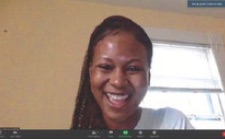Cambridge team working to shape transformative nonviolent response option
Greenfield Recorder, July 28, 2021, p. 1
By ELLA ADAMS, For the Recorder
GREENFIELD — Activist Queen-Cheyenne Wade shared her ideas for replacing traditional policing and carceral systems with nonviolent responses with the Greenfield community on Monday as part of a virtual program organized by Racial Justice Rising and the Traprock Center for Peace and Justice
Wade is one of the founders of the Cambridge–based Holistic Emergency Alternative Response Team. HEART was established as a result of the Cambridge City Council’s effort to create an alternative to traditional policing. That system, and what city officials decided on for an alternative response team, Wade explained, not only lacked accountability but was different than what the community desired for alternative response.
Enter The Black Response — a group of young Cambridge residents who wanted to create a program that would “work toward building systems away from punitive or punishment-based practices and systems, and would actually be rooted in transformative practices and policies,” Wade explained.
The group first convened last summer and began by writing an open letter to the community about their concerns regarding representation in city government. A short while later, with more than 900 signatures on a petition of concern, HEART was in the works. Creating the organization involved not only bringing voices to the table that had been excluded, but ensuring collective ownership of the program.

Queen-Cheyenne Wade speaks to Zoom participants about the Holistic Emergency Alternative Response Team (HEART) in Cambridge, which she helped found.
HEART independent of police
“We wanted to make sure that we were not just getting service providers and community organizations, but community members who were actually living in over-policed communities, unhoused folks who were actually experiencing police interaction, and seeing the way that connected to other carceral or punishment-based systems,” Wade said.
The group, led by a senior management team, began meeting with interested people weekly, working on a zero hierarchy, collaborative process of community education, collective designand defunding/ allocation.
When HEART eventually has enough implementation, Wade said, organizers hope it will offer evidence that this type of model works better than traditional policing.
“There is a large community of people around the country and around the globe that are not being serviced or supported by our system, and reforming it is just not going to work,” she said. “HEART is going to have zero police interaction, meaning that police are not going to be called if HEART is there and HEART will not call the police.”
Looking at the root causes of why harm and conflict arise in communities is inherent in the consensual care HEART wants to provide for its Cambridge community.
The research the HEART team has been doing includes interviews and surveys of policed individuals within the Cambridge community, especially youths, revolving around their experiences and how a nonviolent program would help them feel supported. As a result, HEART is acting as a quasi nongovernmental organization, meaning it is funded by the city in part, but is not part of city government and is gathering other funding.
Part of HEART’s research included learning about other community- and holistic based safety programs across the country. While HEART (like any specific city program), Wade said, can’t be “copy and pasted” into another city, it’s important to understand how other programs before them have fulfilled varying community needs.
Questions from the audience were fielded by Traprock Center for Peace and Justice member Pat Hynes of Montague, many of which included inquiries about how to sustain a process like that of HEART in smaller Western Massachusetts towns, and discussion about including police in these conversations. Wade emphasized the importance of collective ownership and support, and why she believes that process should center on folks most impacted by the system rather than those running it.
“We can’t keep centering the police on thinking about alternatives because, honestly, they’re not motivated to think about an imagined alternative,” Wade said. “They’re not living in fear of police violence. They’re not living in the margins.”
To learn more about HEART, visit https://linktr.ee/CambridgeHEARTprogram
(This program was recorded and is available at: https://youtu.be/UER6KJS5GGY?t=46)